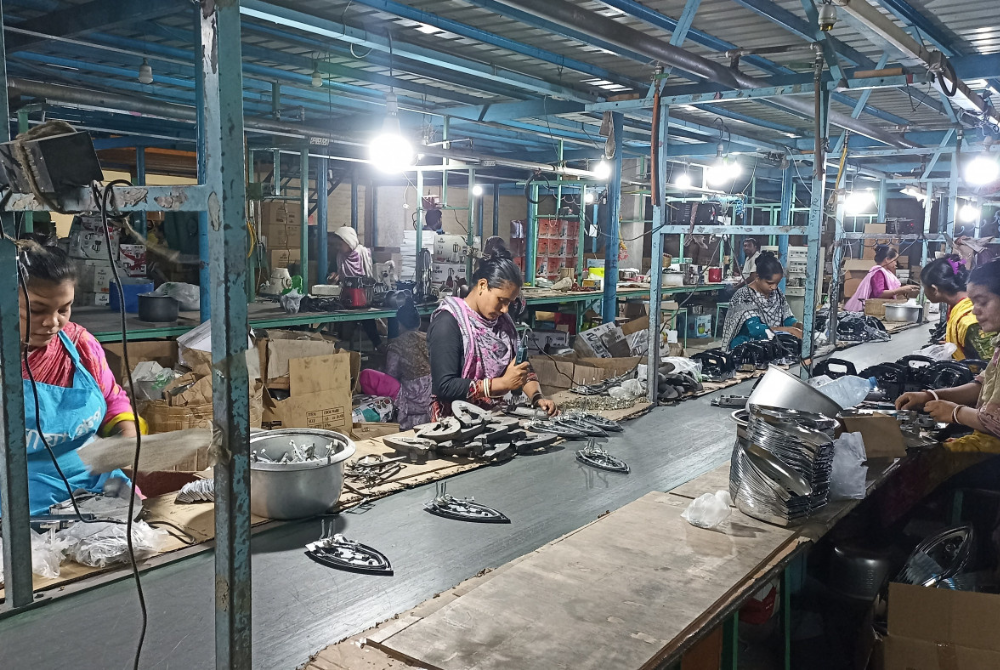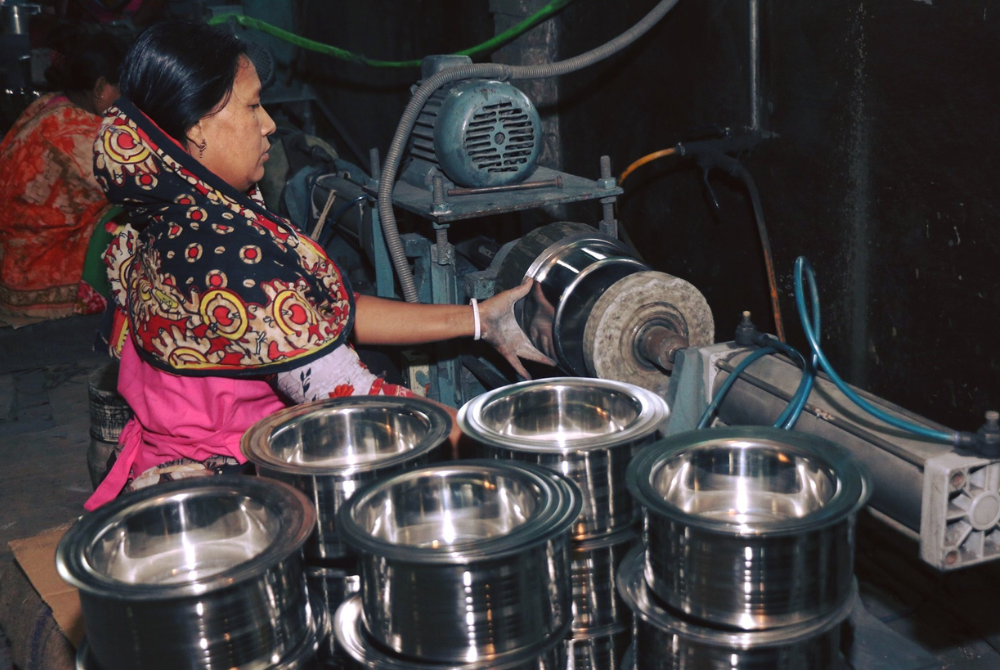Exploring Saidpur’s Cookware: A Global Footprint
In the late 1970s, the aluminum industry was virtually non-existent in Nilphamari, despite the surging demand for aluminum products in the region. To meet this demand, products were sourced from Bogura. However, recognizing Bogura’s success, a similar enterprise began to thrive in the neighboring districts.
Enter Royal Relax Metal Industries, a subsidiary of the Noah Group, established in Saidpur, Nilphamari, in 1978 with the goal of producing aluminum products. Over the span of 32 years, it transformed into the sole export-oriented cookware industry in the northern region.
Today, Royal Relax Metal Industries exports its merchandise to three countries – India, Bhutan, and Nepal – with an annual turnover ranging from three to five lakh dollars. In the current month, the company has ambitious plans to export products worth $22,000 to Bhutan.
The pivotal transformation of the company began in 2004 when it ventured into manufacturing steel-made pressure cookers. Subsequently, it expanded its product line to include rice cookers, gas stoves, kettles, blenders, induction stoves, and non-stick products, marking its entry into the global market in the fiscal year 2010-11.
situated conveniently near the central bus terminal of Nilphamari, adjacent to the Saidpur-Rangpur Highway, Royal Relax Metal Industries was born on approximately three acres of land in 1978. The company boasts an extensive array of kitchen products, comprising pots, pans, ladles, cooking pots, non-stick fry pans, casseroles, and woks.
The Saidpur factory, which initially commenced operations in Bogura, traces its origins to the Dupchanchia upazila of Bogura. Due to its accessible transportation options via rail and river routes, the region welcomed its first aluminum industry back in 1954. About 15 establishments gradually emerged, including the factory owned by Raju Poddar, now a director of Royal Relax Metal Industries. As one of Raju’s sisters settled in Saidpur through marriage, their family’s ties with the town deepened. Saidpur, thanks to its robust rail and road connectivity, has historically held commercial significance. In the 1970s, members of Raju’s family discerned the burgeoning demand for aluminum products in the region and established an aluminum factory near the Saidpur Bus Terminal.

Courtesy: The Business Standard
At present, the company is under the joint stewardship of directors Raju Poddar and Gokul Kumar Poddar, with ownership vested in Puja Devi Poddar, Gokul Kumar Poddar’s wife. Initially, foreign technicians were recruited to oversee the factory machinery and train local talents. However, local technicians have now assumed the mantle, exhibiting exceptional expertise.
Royal Relax Metal Industries sources various raw materials, including aluminum circles, PTFE coatings, fittings, polishing materials, polishing buffs, SS circles, SS fittings, and electric rice cooker components from India, China, and Malaysia. These quality raw materials form the foundation for their superior product range.
Given its strategic location, Saidpur plays an indispensable role in the factory’s operations, serving an extensive market area encompassing Rangpur and Dinajpur. The factory employs approximately 300 workers, including 40% women and 5 to 7 individuals with disabilities.
Take, for example, Putul Rani, an erstwhile tailor who now serves as a laborer in the factory. Residing in Taraganj, Saidpur’s neighboring area, Putul is married to Pratap, who works at a Taraganj garment factory due to his walking disabilities. Putul’s foot problems restrict her from engaging in other vocations, but she vouches for the conducive working environment and fair compensation at Royal Relax Metal Industries. For her, working there brings a sense of tranquility.
Then there’s Monira Khatoon, a stalwart with a decade of experience at Royal Relax Metal Industries. She’s a versatile worker capable of handling an array of tasks related to iron production. Monira’s earnings are instrumental in supporting her family, and she attests to the factory’s unwavering commitment to producing top-notch products.
According to Raju Poddar, in the past, Bangladesh heavily relied on imports for a range of kitchen items, including rice cookers, pressure cookers, and blenders. However, the landscape has evolved, with only 1% of these items currently being imported. Many local companies have stepped up their game and are not only fulfilling domestic needs but also exporting their products to Europe, bolstering the nation’s income significantly.
This establishment is on a mission to promote products adorned with the “Made in Bangladesh” label, instilling pride in the nation. Raju reveals that the company is presently utilizing just 25% of its capacity, leaving ample room for expansion.
Nonetheless, amid its growth and promise, Royal Relax Metal Industries confronts various challenges. Issues such as erratic power supply and harassment by VAT and tax officials persist, laments Raju.
“We contribute Tk10 crore to Tk12 crore in VAT to the government annually, in addition to paying taxes amounting to at least Tk2.5 crore per annum. Despite this, some unscrupulous tax officials resort to illicit means to extort money from us, creating a hostile environment. Such harassment has led many business owners to contemplate shuttering their factories,” he asserts.
Price hikes in fuel, power outages, and other factors have also affected market competitiveness. However, a glimmer of hope emerges as the gas pipeline extends to Nilphamari. Prioritizing gas connections for factories is essential to bolster the local industry, granting Bangladesh a competitive edge in product exports.
Akhtar Hossain Swapan, a director of the Nilphamari Chamber of Commerce and Industry, underscores the significance of developing Chilahati, a district bordering India, into a fully-fledged trade and commerce port. This strategic move promises improved connectivity with India. Furthermore, the transformation of Saidpur airport into an international gateway would facilitate product exports and catalyze the region’s evolution into a pivotal industrial hub, paving the way for thousands of employment opportunities.
Reference and Source: The Business Standard

